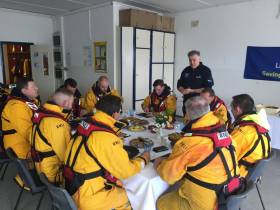Displaying items by tag: Derry Clarke
#RNLI - Derry Clarke, owner and chef at the renowned L’Ecrivain restaurant, turned Valentia Lifeboat Station in Kerry into one of the country’s top dining sports on Friday (29 September) as he treated the volunteer lifeboat crew to a delicious Fish Supper to promote the RNLI’s latest fundraising initiative.
Clarke, who is also star of RTE’s Lords and Ladles, is supporting the RNLI’s Fish Supper campaign for 2017 from 13-15 October — and is calling on people across Ireland to sink their teeth into a delicious fish dish to raise vital funds for the lifesaving charity.
The menu for the lifeboat crew comprised a number of mouth-watering seafood dishes including cured salmon with cucumber, apple and dill; seafood chowder; Flaggy Shore oysters and Lambay Island scallops with cauliflower and raisins.
Local hotel and restaurant The Royal also got involved when chef Ryan Walsh added a surprise extra course of fish gratin.
Speaking while cooking al fresco at the lifeboat station, Clarke said: “It is an absolute pleasure to cook for the Valentia lifeboat crew. I love cooking for the RNLI, and seafood dishes are always a crowd pleaser.
“I do an annual BBQ for the RNLI with my wife Sallyanne on Sherkin Island and at Courtown in Wexford, so it’s about time I got out to the West Coast. The only issue is that you never know if you have enough food as lifeboat crew are always hungry.”
Clarke also urged anyone who hasn’t tried cooking with fish to give it a try and impress your friends and family while raising vital funds for the RNLI’s brave lifeboat crews.
“We are lucky enough to live on an island with a beautiful array of fish on our doorstep. It’s a wonderful idea for a fundraiser.”
The occasion was captured by photographer Jack Lowe, who is travelling around the UK and Ireland photographing RNLI lifeboat volunteers through a Victorian process that captures the stunning images on glass. Jack’s visit to Valentia RNLI marked his 100th lifeboat station.
Valentia RNLI coxswain Richard Quigley added: “Our pagers can go off at any time and many a meal has been interrupted for a lifeboat launch. Holding a fish supper is a great way for people to support us. They can sign up for a free fundraising pack and then enjoy hosting a fun evening with friends and family.
“If like us, you’re not Derry Clarke in the kitchen, then you can always serve up something simple like a fish finger sandwich or fish and chips. We really don’t mind.”
To receive a free Fish Supper fundraising pack, and to see some mouth-watering recipe inspiration, visit RNLI.org/FishSupper.
RNLI lifeboat crews across Ireland launched 1,136 times in 2016, rescuing 1,649 people. Kerry lifeboat stations launched 38 times and rescued 47 people in that same period, spending a total of 393 hours at sea on service.
Last year, chef Clodagh McKenna visited Howth RNLI to support the charity, which relies on donations from the public to continue its lifesaving service.





























































